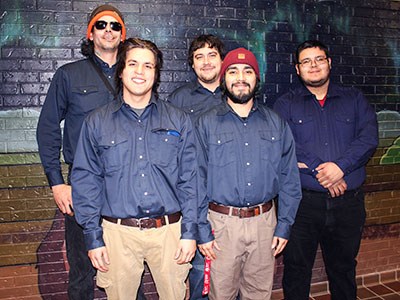When Austin Atatise-Morriseau graduates from Cambrian College in 2017, he won’t have to spend any time handing out his resumé.
Atatise-Morriseau and his five classmates have guaranteed jobs at Resolute Forest Products upon graduating from the Sudbury college’s two-year industrial mechanical millwright technical program. It’s part of a new education funding model that brings together government, industry and First Nations communities.
Cambrian College, Resolute and the communities of Red Rock and Fort William First Nation are working with funding from the Ontario government to offer the training to six members of the communities.
“I’d been trying to get out of my town for three years,” said Fort William’s Atatise-Morriseau. The students flew down, got set up in the school’s residence, and started on Jan. 11.
Ontario is giving $138,156 to cover the cost of tuition, books, supplies and accommodation over the two-year program. The money comes from the Targeted Initiative Fund (TIF), which supports educational institutions and community-based organizations, and efforts to improve programming, service delivery or education and training opportunities.
Additional living costs are covered by the students’ home communities, Cambrian provides tutoring and assistance through the Wabnode Centre for Aboriginal Services, and the students will complete their apprenticeship at Resolute before starting their employment with the company.
Jason Thompson, from Thunder Bay’s Superior Strategies, connected Resolute to the community leaders and is acting as a third-party co-ordinator for the program.
For Resolute, the gain lies in securing trained employees at a time they need them most, and in a way that benefits the communities they work with.
“Over the next few years, many of our long-standing workers will be taking a well-deserved retirement, and we will need to attract skilled candidates who are motivated and eager to learn,” said Seth Kursman, Resolute’s vice-president of corporate communications, sustainability and government affairs.
Resolute hired 1,300 new employees in 2015, as part of a plan to hire more than 2,000 employees by 2018.
“Our involvement with this program reflects Resolute’s commitment to creating opportunities for mutual benefit alongside First Nations in the areas where we operate, and to building a strong, diverse workforce,” said Kursman.
The program features all of the coursework in one go with an apprenticeship at the end, rather than classwork alternating with apprenticeship work.
“The millwrights can go to school once and don’t have to come back,” said Richard Oullet, Wabnode’s executive director. “It’s better for these remote students.”
“It’s a new, unique model and hopefully it’s the way that we go,” said Oullet, and the students are hoping so, too.
“The better we do, the better for future students,” said Jacob Boucher, another Fort William arrival. “We’re motivated to be ambassadors.”
Most of the students said they didn’t know exactly what a millwright position entailed before applying, but the training aims to develop each student into an “industrial jack-of-all-trades.” They will be essentially setting up, maintaining and taking apart complex plant machinery.
“Through my whole life I tinkered, taking stuff apart,” said Boucher, who did a short stint in psychology at Lakehead University. “I’ve loved that this program is hands-on.”
“I’d always had a feeling I’d be working with my hands,” echoed Atatise-Morriseau. “It was a huge opportunity; it would’ve been crazy to pass it up.”




